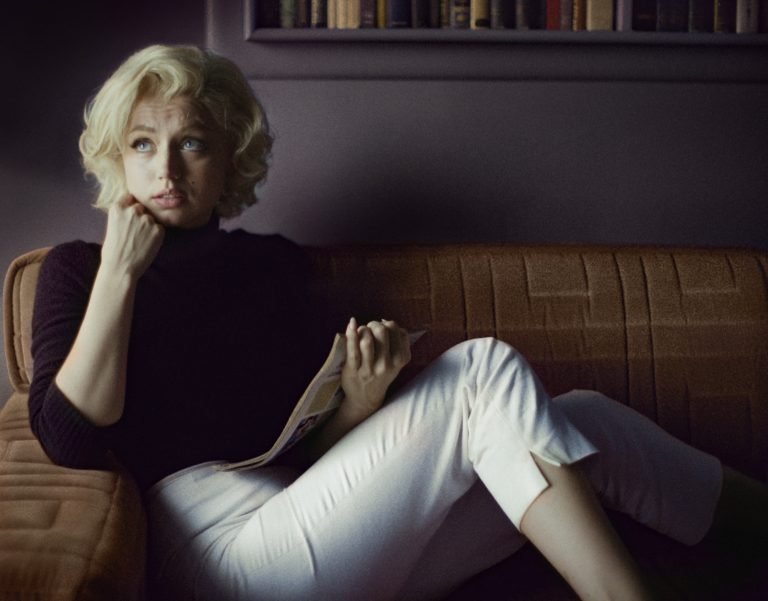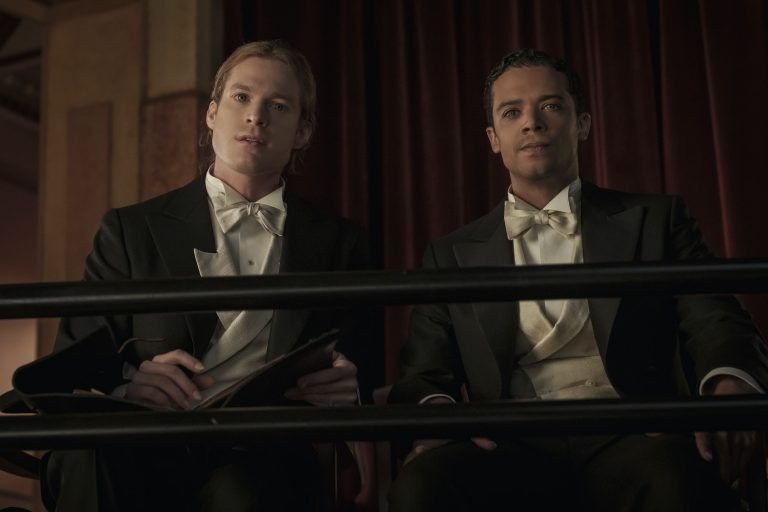Rain Dogs (Season 1), Episode 2 Recap & Ending Explained: Since ‘Last of Us’ has finished its first season, you can count on ‘Rain Dogs’ as your next weekly ritual on HBO. Created by Cash Carraway, it tells a gut-wrenching story of working-class Brits through a humanist lens. While being consistently humorous, it never loses a sensible lookout into their lives.
In its first episode, Costello Jones managed to get over the sudden conflict of homelessness. However, other woes in her life keep her from achieving her dream of being a paid writer. The new episode largely focuses on that aspect while fleshing out not-so-pleasing aspects of her, Selby, and Gloria’s lives. Before delving into what happens, be aware that there are spoilers ahead.
Rain Dogs (Season 1), Episode 2 Recap
Episode 2: Scenes from a Crucifixion
After getting thrown out of her apartment, Costello (Daisy May Cooper) kept calling her friend Gloria (Ronke Adekoluejo) for help. She even went to her place, hoping to get a bed for the night. However, Gloria was nowhere to be found. Now, she apologizes for her disappearance and asks Costello where she is staying at the moment. Costello says that Florian Selby (Jack Farthing) helped her with money. That’s how Gloria learns that their old friend is out of prison.
Apparently, Costello had to go through the hassle of fighting with the police, who accused her and Iris (Fleur Tashijian) of breaking and entering. Alas, everything gets sorted. However, her dream of writing is still a dream since she has not found a paid gig for it. So, she continues working at a peep show store, selling sexual pleasure to perverted souls. Her manager, Konstantin (Dragos Mostenescu), looks at her and other employees as objects of desire, just like their customers.
Costello’s co-worker, Immy (Anna Andresen), suggests she use Only Fans to get popularity. However, Costello isn’t interested in that. She wants her writing to be taken seriously, not be considered a petty sell-out. She goes back to her job and dances around a pole, expecting a pervert to walk up to her booth. But suddenly, she gets a visit from Sophie (Alice Haig), a reporter from the London Reformer who learned about Costello online. She praises her work and what she stands for. Costello clarifies that she stands for absolutely nothing with absolute clarity.
In a single line, the writing shows how ‘standing up for something’ has become a claim for self-reverence – which is something that Costello is clearly not interested in being a part of. Throughout their dialogue, Costello keeps crushing Sofia’s journalistic idealism while Sophie continues to persuade her to be a part of their world. She wants to take her interview. However, Costello wants to do the writing on her story. Besides, she does not want to write herself off as a pitiable figure that liberals like Sophie would love to gain a sense of self-importance from. Sophie agrees to it and even to paying her a decent amount. So, Costello accepts the deal.
While she is at her job, Iris and Selby get some time to bond together. She says that she might need therapy considering what she went through with her mother. It reminds Selby of Tony Soprano, while Iris notes that she is more like Christopher. Despite her young age, she is certain that she isn’t interested in cognitive behavioral therapy. There’s playfulness and ‘making light of a serious situation’ that we witness between them.
Iris goes to play with Selby at Fen’s (Daniel Phung) place and learns a few tricks in Mahjong. She wasn’t aware that Selby was in prison and was told that he went to live with his mother. So through his stories about his mother, she tries to make sense of her relationship with Costello.
Meanwhile, Gloria goes back to work at her family’s funeral home but struggles to prove her worth to her father. It is because she disappointed him in the past with many silly mistakes of impulsive actions. Her father isn’t ready to forgive her that easily. When he leaves the place of her responsibility, Gloria plays a peppy music track and starts dancing despite the presence of a casket in the room. Later, the son of that dead man arrives. Still, instead of insulting Gloria, Paul (Sam Hazeldine) chooses to let her give him company.
With her, he tries to relieve his pain of not seeing the old man for over 45 years. Unsure how he should be grieving, he drinks beer with her. Eventually, it leads them to have sex without a thought about whether it is appropriate or not. It becomes his way of retribution for his father, who never made him feel validated.
Meanwhile, back at her apartment, Costello dedicatedly writes her new piece as if her whole life depended on it. In a way, it is, since she can use the skills she has honed if she hits gold at this job. Selby returns to her place and jokes about how she is writing for these people, who will use her pieces to showcase their generosity.
Later, he gets Iris, to sleep, who is worried about how to mingle with the wealthy lot from her school. Selby doubles as her friend and as her caring brother, hoping she leads a more satisfactory life than him. Right then, Gloria knocks on the door and barges in with Paul hoping to have sex with him. Yet no matter any words, actions, or distractions, Costello keeps writing.
The next day, Costello goes to clean the bedridden Lenny’s (Adrian Edmondson) place, who is at the stage where he needs an oxygen mask to breathe. Even then, he does not let go of his habit of smoking a cigarette or two. While doing this chore, she also gets gory details from his life that she hopes to include in her piece. After speaking with this stinky pervert, she heads out after taking one of his pornographic paintings to gift her high-brow friend.
While the painting clearly had a vagina, that friend sees it tilted sideway and considers it to represent an Indian sunset. Despite her superficial remark, Costello stays there to be a part of this gathering, although not making any conscious effort to blend in. She tells about her upcoming work and also shows her literary knowledge without the least bit of pretense or snobbery. You rather sense her clarity in saying – this is who I am. Unfortunately, her writing career could not materialize till then despite her fantastic grades in a literary degree.
At that time, Selby goes to a group therapy session for those who committed violent crimes in the past (there’s the dark past that made him and Costello grow apart). While other members start sharing their realizations, he gets bored by them. It is his anger at how surface-level their understanding is. However, it also reflects his difficulty in confronting himself as candidly and kindly as they do. While speaking with Iris, he also mentions how therapy did not work for him in the past. So, his reaction also seems to result from his fear of confrontation or of revisiting the past.
Meanwhile, Richard (Tom Durant Pritchard) comes from the newspaper to take Costello’s picture for the piece. He awkwardly enters her peep show store and tries to be as respectful and modest as possible in that sexually charged setting.
Rain Dogs (Season 1), Episode 2 Ending Explained
Does Costello finally realize her dream as a writer?
When ‘the piece’ gets published in the newspaper, Costello notices that Sophie has changed it to her own voice. She took titbits from Costello’s work and entered the pity-inducing, generic tone to her article, written in the form of an interview. Costello gets devastated by it. Selby begins with ‘I told you’ remarks but later tries to cheer her up. They return home and read the piece reflecting the same attention-hungry surface-level understanding of journalists that Costello despises.
As a result, Costello pledges to write about Sophie with disdain when she writes her novel. Later, at her job, she leaves after her shift is over. Konstantin asks her to work another shift. She dismisses his order despite his threats to fire her. While walking out with Gloria, she gets stopped by Richard. He makes a performative gesture of burning the newspaper with Sophie’e piece. Costello makes fun of him and it. But Gloria still finds this gesture better to do something than nothing. He asks Costello out for a coffee. She accepts it.
Like the writing throughout its episode, the ending also shows the writer’s skill in presenting its bleak world with a mix of humor and humanity. On one side, Costello is bound to be crushed seeing her first chance of dignified recognition as a writer get squandered. On the other hand, she still harbors a dream of writing a novel. The sweetness of that moment is unparalleled, and the execution is smart enough not to make that moment appear sappy. She later leaves her work despite the threat of getting fired. There’s clearly a sense of confidence that is rarely found in characters like hers portrayed otherwise.


![One Fine Morning [2022] Review – Mia Hansen-Løve’s intimate drama features a luminous Léa Seydoux but feels overly familiar](https://79468c92.delivery.rocketcdn.me/wp-content/uploads/2022/12/ONE-FINE-MORNING-2022-MOVIE-REVIEW-768x415.jpg)



![Germany, Year Zero [1948] MUBI Review – A Tale of Lost Childhood in War-Ravaged Berlin](https://79468c92.delivery.rocketcdn.me/wp-content/uploads/2020/11/Germany-Year-Zero-1948-768x432.jpg)
